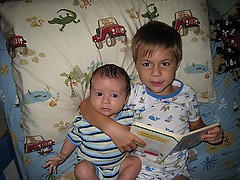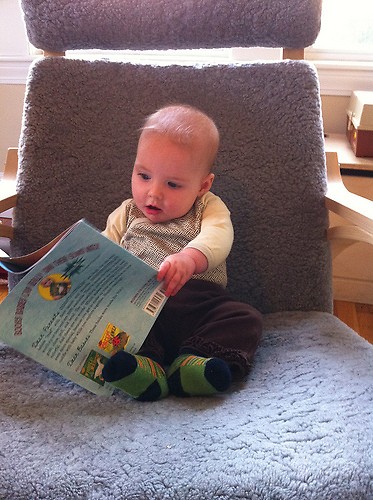
Reading to toddlers and infants early can really help children with language development. /Dave Matos

The pre-reading series at Grand Rapids Public Libraries is a good way to help children develop their language skills. /Sonya Green

Reading to toddlers and infants early can really help children with language development. /Dave Matos
Grand Rapids Public Libraries are helping parents with their children’s language development. At all of the branches the libraries offer three different sessions: Pre-Reading Classes for Babies, Pre-Reading Classes for Toddlers, and Pre-Reading Classes for Children. These sessions are not a new--they have been around for many years. In the past the sessions were just referred to as "story times."
Reading to children, it turns out, is no small thing. “It’s an opportunity to share great stories with kids,” McCarville, the Youth Service Coordinator at the main branch of Grand Rapids Public Library, said. “As long as they can hear and practice words they are in the process of language development.”
According to the website of the National Institute of Deafness and other Communication Disorders: “The most intensive period of speech and language development for humans is during the first three years of life. . .There is increasing evidence suggesting that there are 'critical periods' for speech and language development in infants and young children. This means that the developing brain is best able to absorb a language, any language, during this period ”
McCarville agrees, "Babies can start devleoping language before they are born."
At the main branch, 111 Library Street, the pre-reading series for babies, ages birth-18 months, is held on Tuesdays. On Wednesdays they have a pre-reading session for toddlers, ages 18 months to 3 years, and on Saturdays they have a pre-reading series for children ages 3-5. All sessions are in the second level Storytime room and run from 11-11:30 a.m. Other branch sessions vary depending on their schedule. Not all sessions take place on the same days as the main branch.
These reading sessions all differ, but they do share some common features. Each session has a story component. Between two to five stories are read in each session. Some of the sessions use finger plays, which is a combination of rhyming and hand activities. In addition, the most of the sessions include musical components and games.
The story component is much shorter in the baby classes then in the classes for older children. The story component in the baby classes is also more repetitive, and there are toys for the babies to play with.
This is an opportunity for anybody who is looking to share with children. This program is a way for parents to gather and reflect on learning methods for their children in all of the development stages. It provides an opportunity for parents to socialize with other parents as well.
All of the branches encourage interested parents to stop by or call.
The Rapidian, a program of the 501(c)3 nonprofit Community Media Center, relies on the community’s support to help cover the cost of training reporters and publishing content.
We need your help.
If each of our readers and content creators who values this community platform help support its creation and maintenance, The Rapidian can continue to educate and facilitate a conversation around issues for years to come.
Please support The Rapidian and make a contribution today.